Fleurs du Mal Magazine


Or see the index
Op zondag 11 maart is de première van de documentaire Dichter tegen de tijd, een portret van Jasper Mikkers, te zien in de Nieuwe Vorst, Willem II-straat, Tilburg. Aanvang 16.00 uur. Na de vertoning vindt aldaar ook de presentatie plaats van zijn nieuwe bundel Nachtleven, met illustraties van Daisy Karthaus.
 Jasper Mikkers (Oerle, 1948) debuteerde in 1974 onder het pseudoniem Tymen Trolsky bij de Bezige Bij met de roman Hyacinta en Pasceline. Bij dezelfde uitgeverij verschenen later datzelfde jaar maar liefst drie dichtbundels .Na de onthulling van zijn pseudoniem in 1976 volgden nog vele publicaties, zowel onder de naam Tymen Trolsky als zijn echte naam. Naast dichtbundels onder meer het reisboek De weg van de regen (1990), de verhalenbundel De kleine jongen en de rivier (1994), en de romans Het einde van de eeuwigheid (2000) en Karl Marx Universiteit (2009).
Jasper Mikkers (Oerle, 1948) debuteerde in 1974 onder het pseudoniem Tymen Trolsky bij de Bezige Bij met de roman Hyacinta en Pasceline. Bij dezelfde uitgeverij verschenen later datzelfde jaar maar liefst drie dichtbundels .Na de onthulling van zijn pseudoniem in 1976 volgden nog vele publicaties, zowel onder de naam Tymen Trolsky als zijn echte naam. Naast dichtbundels onder meer het reisboek De weg van de regen (1990), de verhalenbundel De kleine jongen en de rivier (1994), en de romans Het einde van de eeuwigheid (2000) en Karl Marx Universiteit (2009).
In de periode 2013-2015 was hij stadsdichter van Tilburg; hierover schreef hij de bundel Gespiegelde stad (2015).
Nachtleven is de derde dichtbundel die hij publiceert bij de bibliofiele uitgeverij Brandon Pers, eerder verschenen Kwatrijnen (1979) en De landmeters van de keizer (2002).
Nachtleven is in meer dan een opzicht een opvallende bundel. Zoals de dichter zelf in het voorwoord schrijft: ‘Aanzet tot het schrijven van deze bundel lag in het idee dromen die regelmatig terugkwamen vast te leggen’. En wat deze uitgave zeker zo bijzonder maakt zijn de erin opgenomen tien prachtige aquarellen van Daisy Karthaus die aansluiten bij de thematiek van de tweeëntwintig sonnetten.
Nachtleven is een dichtbundel van Jasper Mikkers met tien aquarellen van Daisy Karthaus. Wilt u verzekerd zijn van een exemplaar van Nachtleven dan kunt u reserveren bij de secretaris van de Brandon Pers (via cvanraak@online.nl )
De prijs bedraagt euro 17,50 (excl. Porto) en de oplage is 140 exemplaren.
fleursdumal.nl magazine
More in: - Book Lovers, - Book News, Archive K-L, Archive M-N, Art & Literature News, Illustrators, Illustration, Jasper Mikkers, Mikkers, Jasper
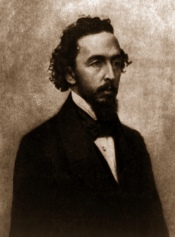
Bedouin Song
From the Desert I come to thee
On a stallion shod with fire;
And the winds are left behind
In the speed of my desire.
Under thy window I stand,
And the midnight hears my cry:
I love thee, I love but thee,
With a love that shall not die
Till the sun grows cold,
And the stars are old,
And the leaves of the Judgement
Book unfold!
Look from thy window and see
My passion and my pain;
I lie on the sands below,
And I faint in thy disdain.
Let the night-winds touch thy brow
With the heat of my burning sigh,
And melt thee to hear the vow
Of a love that shall not die
Till the sun grows cold,
And the stars are old,
And the leaves of the Judgement
Book unfold!
My steps are nightly driven,
By the fever in my breast,
To hear from thy lattice breathed
The word that shall give me rest.
Open the door of thy heart,
And open thy chamber door,
And my kisses shall teach thy lips
The love that shall fade no more
Till the sun grows cold,
And the stars are old,
And the leaves of the Judgement
Book unfold!
Bayard Taylor
(1825-1878)
Bedouin Song
fleursdumal.nl magazine
More in: Archive S-T, Archive S-T, CLASSIC POETRY

Vincent Berquez©: Cat in dusk
Vincent Berquez is a London–based artist and poet. He has published in Britain, Europe, America and New Zealand. His work is in many anthologies, collections and magazine worldwide. Vincent Berquez was requested to write a Tribute as part of ‘Poems to the American People’ for the Hastings International Poetry Festival for 9/11, read by the mayor of New York at the podium. He has also been commissioned to write a eulogy by the son of Chief Albert Nwanzi Okoluko, the Ogimma Obi of Ogwashi-Uku to commemorate the death of his father. Berquez has been a judge many times, including for Manifold Magazine and had work read as part of Manifold Voices at Waltham Abbey. He has recited many times, including at The Troubadour and the Pitshanger Poets, in London. In 2006 his name was put forward with the Forward Prize for Literature. He recently was awarded a prize with Decanto Magazine. Berquez is now a member of London Voices who meet monthly in London, United Kingdom.
Vincent Berquez has also been collaborating in 07/08 with a Scottish composer and US film maker to produce a song-cycle of seven of his poems for mezzo-soprano and solo piano. These are being recorded at the Royal College of Music under the directorship of the concert pianist, Julian Jacobson. In 2009 he will be contributing 5 poems for the latest edition of A Generation Defining Itself, as well as 3 poems for Eleftheria Lialios’s forthcoming book on wax dolls published in Chicago. He also made poetry films that have been shown at various venues, including a Polish/British festival in London, Jan 07.
As an artist Vincent Berquez has exhibited world wide, winning prizes, such as at the Novum Comum 88’ Competition in Como, Italy. He has worked with an art’s group, called Eins von Hundert, from Cologne, Germany for over 16 years. He has shown his work at the Institute of Art in Chicago, US, as well as many galleries and institutions worldwide. Berquez recently showed his paintings at the Lambs Conduit Festival, took part in a group show called Gazing on Salvation, reciting his poetry for Lent and exhibiting paintings/collages. In October he had a one-man show at Sacred Spaces Gallery with his Christian collages in 2007. In 2008 Vincent Berquez had a solo show of paintings at The Foundlings Museum and in 2011 an exposition with new work in Langham Gallery London.
fleursdumal.nl magazine for art & literature
More in: Berquez, Vincent, FDM Art Gallery, Natural history, Vincent Berquez
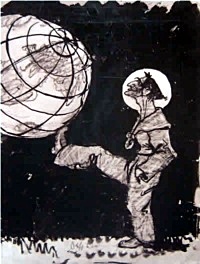
Joachim Ringelnatz
Bumerang
War einmal ein Bumerang;
War ein weniges zu lang.
Bumerang flog ein Stück,
Aber kam nicht mehr zurück.
Publikum – noch stundenlang –
Wartete auf Bumerang.
Joachim Ringelnatz
(1883 – 1934)
Bumerang
fleursdumal.nl magazine
More in: Archive Q-R, Archive Q-R, Joachim Ringelnatz
For the first time in a quarter century, a major new volume of translations of the beloved poetry of Federico García Lorca, presented in a beautiful bilingual edition.
 The fluid and mesmeric lines of these new translations by the award-winning poet Sarah Arvio bring us closer than ever to the talismanic perfection of the great García Lorca. Poet in Spain invokes the “wild, innate, local surrealism” of the Spanish voice, in moonlit poems of love and death set among poplars, rivers, low hills, and high sierras.
The fluid and mesmeric lines of these new translations by the award-winning poet Sarah Arvio bring us closer than ever to the talismanic perfection of the great García Lorca. Poet in Spain invokes the “wild, innate, local surrealism” of the Spanish voice, in moonlit poems of love and death set among poplars, rivers, low hills, and high sierras.
Arvio’s ample and rhythmically rich offering includes, among other essential works, the folkloric yet modernist Gypsy Ballads, the plaintive flamenco Poem of the Cante Jondo, and the turbulent and beautiful Dark Love Sonnets—addressed to Lorca’s homosexual lover—which Lorca was revising at the time of his brutal political murder by Fascist forces in the early days of the Spanish Civil War.
Here, too, are several lyrics translated into English for the first time and the play Blood Wedding—also a great tragic poem. Arvio has created a fresh voice for Lorca in English, full of urgency, pathos, and lyricism—showing the poet’s work has grown only more beautiful with the passage of time.
Federico Garcia Lorca may be Spain’s most famous poet and dramatist of all time. Born in Andalusia in 1898, he grew up in a village on the Vega and in the city of Granada.
His prolific works, known for their powerful lyricism and an obsession with love and death, include the Gypsy Ballads, which brought him far-reaching fame, and the homoerotic Dark Love Sonnets, which did not see print until almost fifty years after his death.
His murder in 1936 by Fascist forces at the outset of the Spanish Civil War became a literary cause célébre; in Spain, his writings were banned. Lorca’s poems and plays are now read and revered in many languages throughout the world.
Poet in Spain
By Federico Garcia Lorca
Translated by Sarah Arvio
Category: Poetry
Hardcover
Nov 07, 2017
576 Pages
$35.00
Published by Knopf
ISBN 9781524733117
new books
fleursdumal.nl magazine
More in: - Book News, Archive G-H, Archive G-H, Art & Literature News, Garcia Lorca, Federico, WAR & PEACE
 Counterculture, die term muntte socioloog Theodore Roszak voor de maatschappelijke revolte in de zestiger jaren. De hoofdstad van deze tegencultuur was New York. Eerst als broedplaats voor nieuwe visies op de kunst, het leven en de wereld: de poëzie van de Beatgeneration; de muziek van Bob Dylan; seks, drugs en rock-’n-roll. Maar later ook als strijdperk voor de Burgerrechtenbeweging, het verzet tegen de oorlog in Vietnam en tegen een materialistische, autoritaire samenleving.
Counterculture, die term muntte socioloog Theodore Roszak voor de maatschappelijke revolte in de zestiger jaren. De hoofdstad van deze tegencultuur was New York. Eerst als broedplaats voor nieuwe visies op de kunst, het leven en de wereld: de poëzie van de Beatgeneration; de muziek van Bob Dylan; seks, drugs en rock-’n-roll. Maar later ook als strijdperk voor de Burgerrechtenbeweging, het verzet tegen de oorlog in Vietnam en tegen een materialistische, autoritaire samenleving.
Zangeres en schrijfster Patti Smith, haar gitarist en rock-’n-roll-historicus Lenny Kaye, en Dylan-biograaf Sean Wilentz – wiens vader de boekhandel 8th Street Books bestierde, waar de Beatgeneration van Allen Ginsberg opbloeide – beleefden, vormden en beschreven deze bijzondere jaren.
Een middag lang vertellen zij, aan de hand van beelden en muziek, het verhaal over wat het was en wat het voor ons nu nog kan betekenen: An Education in Counterculture.
Patti Smith
Verenigde Staten, 1946, zangeres, dichteres en ‘Godmother of Punk’
Patti Smith is zangeres en dichteres. Als ‘Godmother of Punk’ protesteerde zij met krachtige, controversiële muziek tegen de gevestigde orde en wezenloze fabrieksarbeid in de vercommercialiseerde wereld. Ze groeide op met de muziek van Bob Dylan, leefde samen met fotograaf Robert Mapplethorpe en werd een bekend gezicht in de turbulente New Yorkse kunstscene.
In 1974 begon Smith op te treden met gitarist Lenny Kaye, met wie ze nog steeds de kern van de band The Patti Smith Group vormt. Haar debuutalbum Horses (1975) wordt gezien als een van de invloedrijkste albums in de geschiedenis van de rockmuziek. Samen met Bruce Springsteen schreef ze Because the Night, haar grootste hit. Naast vele albums schreef Smith ook dichtbundels en boeken, waaronder Just Kids (2010), haar bekroonde autobiografie over het leven in New York in de jaren zeventig en haar relatie met Mapplethorpe.
Lenny Kaye
Verenigde Staten, 1946, gitarist, componist en schrijver
Lenny Kaye is gitarist, componist en schrijver. Als jonge zanger en gitarist toerde en speelde hij met verschillende bands en werkte hij als journalist voor Amerikaanse muziekbladen. Begin jaren zeventig ontmoette hij Patti Smith in de platenzaak in New York waar hij werkte. Kaye maakte elf albums met The Patti Smith Group en speelde ook in de Jim Caroll Band en Lenny Kaye Connection. Daarnaast werkte hij samen met vele andere prominente musici en artiesten, waaronder Allen Ginsberg, R.E.M. en Suzanne Vega. Momenteel werkt hij aan zijn boek Lightning Striking, over de geschiedenis van de rock-’n-roll. In 2011 werd Kaye geridderd tot Chevalier de l’Ordre des Arts et des Lettres.
Sean Wilentz
Verenigde Staten, 1951, historicus en biograaf van Bob Dylan
Sean Wilentz is schrijver en hoogleraar Amerikaanse geschiedenis aan Princeton. Zijn vader Eli Wilentz was eigenaar van 8th Street Bookshop, het literaire middelpunt van New York in de jaren vijftig en zestig. Zo groeide Wilentz op tussen grootheden van de Beatgeneration zoals Jack Kerouac, Allen Ginsberg en William S. Burroughs, die de boekhandel geregeld bezochten. Wilentz studeerde aan Columbia en Oxford, en promoveerde aan Yale. Zijn bekendste werken zijn het monumentale The Rise of American Democracy (2005); The Age of Reagan (2008); en Bob Dylan in America (2010), over Dylans plaats in de Amerikaanse cultuurgeschiedenis. Wilentz is huishistoricus van de officiële site van Bob Dylan, en schrijft geregeld voor onder meer The New Republic, The New York Times Book Review en Dissent.
An Education in Counterculture
Nexus-symposium
26 mei 2018
13.30 – 17.30
DeLaMar Theater Amsterdam
# meer informatie website Nexus-symposium
fleursdumal.nl magazine
More in: #Editors Choice Archiv, Archive K-L, Archive S-T, Archive S-T, Archive W-X, Literary Events, Nexus Instituut, Patti Smith, Smith, Patti
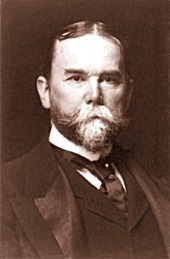
Euthanasia
Take from my hand, dear love, these opening flowers.
Afar from thee they grew, ‘neath alien skies
Their stems sought light and life in humble wise,
Fed by the careless suns and vagrant showers.
But now their fate obeys the rule of ours.
They pass to airs made glorious by thine eyes.
Smit with swift joy, they breathe, in fragrant sighs,
Their souls out toward thee in their last glad hours,
Paying leal tribute to a brighter bloom.
Thus, and not other, is the giver’s fate.
Through years unblest by thee, a cheerless path,
A checkered maze of common glare and gloom,
He came to know in rapture deep though late
How thou couldst brighten life and gentle death.
John Hay
(1838-1905)
Euthanasia
fleursdumal.nl magazine
More in: Archive G-H, Archive G-H, CLASSIC POETRY
 De Parelduiker pakt het thema van de Boekenweek op en stelt de vraag: hoezo natuur?
De Parelduiker pakt het thema van de Boekenweek op en stelt de vraag: hoezo natuur?
In dit themanummer naar aanleiding van de Boekenweek vier verhalen over schrijvers en kunstenaars die ieder een ‘andere’ kant van de natuur leerden kennen.
Joris van Casteren volgde de voetsporen van Gerard Bilders (1838-1865). In het vieze Amsterdam ging deze jonge schrijver en landschapsschilder op tragische wijze ten onder. Tot op zijn sterfbed, in een benauwd pand aan een stinkende gracht, hunkerde hij naar de natuur en het buitenleven.
Madelon de Keizer schrijft over Albert Verwey. Anders dan diens vriend Willem Kloos, die het bij de stad en zijn verlokkingen hield, koos Verwey na zijn huwelijk met Kitty van Vloten voor een leven dichter bij de natuur en stichtte met haar een gezin in een huis op een duin te Noordwijk. Zij zetten zich in voor het herstel van de band tussen mens en natuur, die door de verstedelijking teloor dreigde te gaan.
 Nescio bezong, zo schrijft biografe Lieneke Frerichs, onbezorgd de schoonheid van zomerse glooiende korenvelden, terwijl hij met zijn dochters door Noord-Frankrijk fietste.
Nescio bezong, zo schrijft biografe Lieneke Frerichs, onbezorgd de schoonheid van zomerse glooiende korenvelden, terwijl hij met zijn dochters door Noord-Frankrijk fietste.
Willem van Toorn ten slotte zette zich op initiatief van kunstschilder Willem den Ouden in voor zorgvuldige, vernuftiger dijkverbeteringen die het Nederlandse rivierenlandschap zoveel mogelijk zouden sparen, aldus Marco Daane. Hij laat zien dat Van Toorns betrokkenheid hierbij ook sporen heeft achtergelaten in zijn literaire werk.
In memoriam Jaap Harten en Menno Wigman.
De Parelduiker is een uitgave van Uitgeverij Bas Lubberhuizen – Johannes Vermeerstraat 63 – 1071 DN Amsterdam – Postbus 15511 – 1001 NA Amsterdam – T 020 5706 100
# Voor meer informatie zie de website van de parelduiker
boekenweek 2018
fleursdumal.nl magazine
More in: Art & Literature News, Boekenweek, LITERARY MAGAZINES, Natural history, Wigman, Menno, Willem van Toorn

Sonet
Fra bank to bank, fra wood to wood I rin,
Ourhailit with my feeble fantasie;
Like til a leaf that fallis from a tree,
Or til a reed ourblawin with the win.
Twa gods guides me: the ane of tham is blin,
Yea and a bairn brocht up in vanitie;
The next a wife ingenrit of the sea,
And lichter nor a dauphin with her fin.
Unhappy is the man for evermair
That tills the sand and sawis in the air;
But twice unhappier is he, I lairn,
That feidis in his hairt a mad desire,
And follows on a woman throw the fire,
Led by a blind and teachit by a bairn.
Mark Alexander Boyd
(1563-1601)
Sonet
fleursdumal.nl magazine
More in: Archive A-B, Archive A-B, CLASSIC POETRY
In the language of fan fiction, a ‘Mary Sue’ is an idealised and implausibly flawless character: a female archetype that can infuriate audiences for its perceived narcissism.
 Such is the setting for this brilliant and important debut by Sophie Collins. In a series of verse and prose collages, Who Is Mary Sue? exposes the presumptive politics behind writing and readership: the idea that men invent while women reflect; that a man writes of the world outside while a woman will turn to the interior.
Such is the setting for this brilliant and important debut by Sophie Collins. In a series of verse and prose collages, Who Is Mary Sue? exposes the presumptive politics behind writing and readership: the idea that men invent while women reflect; that a man writes of the world outside while a woman will turn to the interior.
Part poetry and part reportage, at once playful and sincere, these fictive-factive miniatures deploy original writing and extant quotation in a mode of pure invention. In so doing, they lift up and lay down a revealing sequence of masks and mirrors that disturb the reflection of authority.A work of captivation and correction, this is a book that will resonate with anyone concerned with identity, shame, gender, trauma, composition and culture: everyone, in other words, who wishes to live openly and think fearlessly in the modern world.
Who Is Mary Sue? is a work for our times and a question for our age: it is a handbook for all those willing to reimagine prescriptive notions of identity and selfhood.
Sophie Collins is cofounder of tender, an online quarterly promoting work by female-identified writers and artists. She is carrying out research on poetry and translation at Queen’s University Belfast. Collins grew up in Bergen, North Holland, and now lives in Edinburgh. She is co-editor of tender, an online arts quarterly, and editor of Currently & Emotion (Test Centre, 2016), an anthology of contemporary poetry translations. small white monkeys, a text on self-expression, self-help and shame, was published by Book Works in 2017 as part of a commissioned residency at Glasgow Women’s Library.
Sophie Collins
Who Is Mary Sue?
8 February 2018
Published by Faber & Faber
Paperback
£10.99
112 pages
ISBN: 9780571346615
Poetry and prose
new books
fleursdumal.nl magazine
More in: - Book News, Archive C-D, Archive C-D, Art & Literature News, EDITOR'S CHOICE, LITERARY MAGAZINES
Just in time for his 99th birthday, New Directions is proud to present a swift, terrific chronological selection of Lawrence Ferlinghetti’s greatest poems.
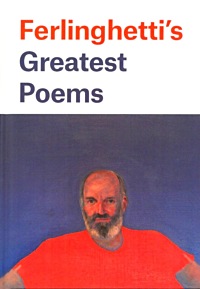 Through this tight lens, it is now possible to see Ferlinghetti—a brilliant and prolific poet—in a richer, broader, and more complex way. From his very first landmark books—Pictures of the Gone World (City Lights, 1955) and A Coney Island of the Mind (New Directions, 1958)—to new work, Ferlinghetti’s Greatest Poems displays every stage of this multifaceted writer’s long and celebrated career. It’s exciting to revisit in one slender volume so much of the splendid, playful, and trenchant work of one of America’s greatest and most popular poets.
Through this tight lens, it is now possible to see Ferlinghetti—a brilliant and prolific poet—in a richer, broader, and more complex way. From his very first landmark books—Pictures of the Gone World (City Lights, 1955) and A Coney Island of the Mind (New Directions, 1958)—to new work, Ferlinghetti’s Greatest Poems displays every stage of this multifaceted writer’s long and celebrated career. It’s exciting to revisit in one slender volume so much of the splendid, playful, and trenchant work of one of America’s greatest and most popular poets.
“A brave man and a brave poet.”––Bob Dylan
Lawrence Ferlinghetti, poet and founder of City Lights Books, author of A Coney Island of the Mind and Pictures of the Gone World, among numerous other books, has been drawing from life since his student days in Paris where he frequented the Academie Julien and where he did his first oil painting.
“Lawrence gets you laughing and then hits you with the truth.”––Francis Ford Coppola
Title: Ferlinghetti’s Greatest Poems
Author: Lawrence Ferlinghetti
Edited by Nancy J. Peters
Publisher New Directions Publishing Corporation
Format Hardcover, $16.95
144 pp.
ISBN-10 081122712X
ISBN-13 9780811227124
Publication Date 21 November 2017
new poetry books
fleursdumal.nl magazine
More in: #Beat Generation Archives, - Book News, - Bookstores, Archive E-F, Archive E-F, Art & Literature News
A look back at the cultural and political force of Pulitzer Prize–winning poet Gwendolyn Brooks, in celebration of her hundredth birthday
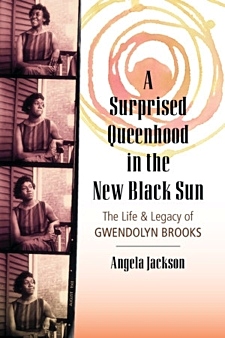 Pulitzer-Prize winning poet Gwendolyn Brooks is one of the great American literary icons of the twentieth century, a protégé of Langston Hughes and mentor to a generation of poets, including Sonia Sanchez, Nikki Giovanni, and Elizabeth Alexander.
Pulitzer-Prize winning poet Gwendolyn Brooks is one of the great American literary icons of the twentieth century, a protégé of Langston Hughes and mentor to a generation of poets, including Sonia Sanchez, Nikki Giovanni, and Elizabeth Alexander.
Her poetry took inspiration from the complex portraits of black American life she observed growing up on Chicago’s Southside—a world of kitchenette apartments and vibrant streets. From the desk in her bedroom, as a child she filled countless notebooks with poetry, encouraged by the likes of Hughes and affirmed by Richard Wright, who called her work “raw and real.”
Over the next sixty years, Brooks’s poetry served as witness to the stark realities of urban life: the evils of lynching, the murders of Emmett Till and Malcolm X, the revolutionary effects of the civil rights movement, and the burgeoning power of the Black Arts Movement. Critical acclaim and the distinction in 1950 as the first black person ever awarded a Pulitzer Prize helped solidify Brooks as a unique and powerful voice.
 Now, in A Surprised Queenhood in the New Black Sun, fellow Chicagoan and award-winning writer Angela Jackson delves deep into the rich fabric of Brooks’s work and world. Granted unprecedented access to Brooks’s family, personal papers, and writing community, Jackson traces the literary arc of this artist’s long career and gives context for the world in which Brooks wrote and published her work. It is a powerfully intimate look at a once-in-a-lifetime talent up close, using forty-three of Brooks’s most soul-stirring poems as a guide.
Now, in A Surprised Queenhood in the New Black Sun, fellow Chicagoan and award-winning writer Angela Jackson delves deep into the rich fabric of Brooks’s work and world. Granted unprecedented access to Brooks’s family, personal papers, and writing community, Jackson traces the literary arc of this artist’s long career and gives context for the world in which Brooks wrote and published her work. It is a powerfully intimate look at a once-in-a-lifetime talent up close, using forty-three of Brooks’s most soul-stirring poems as a guide.
 From trying to fit in at school (“Forgive and Forget”), to loving her physical self (“To Those of My Sisters Who Kept Their Naturals”), to marriage and motherhood (“Maud Martha”), to young men on her block (“We Real Cool”), to breaking history (“Medgar Evers”), to newfound acceptance from her community and her elevation to a “surprising queenhood” (“The Wall”), Brooks lived life through her work.
From trying to fit in at school (“Forgive and Forget”), to loving her physical self (“To Those of My Sisters Who Kept Their Naturals”), to marriage and motherhood (“Maud Martha”), to young men on her block (“We Real Cool”), to breaking history (“Medgar Evers”), to newfound acceptance from her community and her elevation to a “surprising queenhood” (“The Wall”), Brooks lived life through her work.
Jackson deftly unpacks it all for both longtime admirers of Brooks and newcomers curious about her interior life. A Surprised Queenhood in the New Black Sun is a commemoration of a writer who negotiated black womanhood and incomparable brilliance with a changing, restless world—an artistic maverick way ahead of her time.
What shall I give my children? who are poor,
Who are adjudged the leastwise of the land,
Who are my sweetest lepers, who demand
No velvet and no velvety velour;
But who have begged me for a brisk contour,
Crying that they are quasi, contraband
Because unfinished, graven by a hand
Less than angelic, admirable or sure.
from ‘The Children of the Poor’
Angela Jackson is an award-winning poet, playwright, and novelist. She is the author of numerous collections of poetry, including the National Book Award–nominated And All These Roads Be Luminous: Poems Selected and New. Her novel Where I Must Go won the American Book Award in 2009. Its sequel, Roads, Where There Are No Roads, was published in 2017. Additionally, Jackson was longlisted for the Pulitzer Prize and a longlist finalist for the PEN Open Book Award for her 2015 poetry collection, It Seems Like a Mighty Long Time. Other honors include a Pushcart Prize, Academy of American Poets Prize, TriQuarterly’s Daniel Curley Award, and the Poetry Society of America’s Shelley Memorial Award. Jackson lives in Chicago.
A Surprised Queenhood in the New Black Sun
The Life & Legacy of Gwendolyn Brooks
By Angela Jackson
Paperback – $18.00
ISBN 9780807059128
Published by Beacon Press
208 Pages
May 29, 2018
new books
fleursdumal.nl magazine
More in: - Book News, Archive A-B, Archive A-B, Archive I-J, Archive I-J, BIOGRAPHY, REPRESSION OF WRITERS, JOURNALISTS & ARTISTS
Thank you for reading Fleurs du Mal - magazine for art & literature